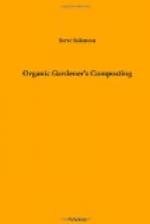Stout, who discovered mulch gardening in Connecticut where irregular summer rains were usually sufficient to water a widely-spaced garden, also mistakenly thought that mulched gardens lost less soil moisture because the earth was protected from the drying sun and thus did not need irrigation through occasional drought. I suspect that drought resistance under mulch has more to do with a plant’s ability to feed vigorously, obtain nutrition, and continue growing because the surface inches where most of soil nutrients and biological activities are located, stayed moist. I also suspect that actual, measurable moisture loss from mulched soil may be greater than from bare earth. But that’s another book I wrote, called Gardening Without Irrigation.
_
Yes, gardening under permanent year-round mulch seems easy, but it does have a few glitches. Ruth Stout did not discover them because she lived in Connecticut where the soil freezes solid every winter and stays frozen for long enough to set back population levels of certain soil animals. In the North, earwigs and sow bugs (pill bugs) are frequently found in mulched gardens but they do not become a serious pest. Slugs are infrequent and snails don’t exist. All thanks to winter.
Try permanent mulch in the deep South, or California where I was first disappointed with mulching, or the Maritime northwest where I now live, and a catastrophe develops. During the first year these soil animals are present but cause no problem. But after the first mild winter with no population setback, they become a plague. Slugs (and in California, snails) will be found everywhere, devastating seedlings. Earwigs and sow bugs, that previously only were seen eating only decaying mulch, begin to attack plants. It soon becomes impossible to get a stand of seedlings established. The situation can be rapidly cured by raking up all the mulch, carting it away from the garden, and composting it. I know this to be the truth because I’ve had to do just that both in California where as a novice gardener I had my first mulch catastrophes, and then when I moved to Oregon, I gave mulching another trial with similar sad results.
Sources for Composters, Grinders and etc.
_
Shredder/Chippers and other power equipment_
I’ve been watching this market change rapidly since the early 1970s. Manufacturers come and go. Equipment is usually ordered direct from the maker, freight extra. Those interested in large horsepower shredder/chippers might check the advertisements in garden-related magazines such as National Gardening, Organic Gardening, Sunset, Horticulture, Fine Gardening, Country Living (Harrowsmith), etc. Without intending any endorsement or criticism of their products, two makers that have remained in business since I started gardening are:
Kemp Company. 160 Koser Road., Lititz, PA 17543. (also compost drums)




